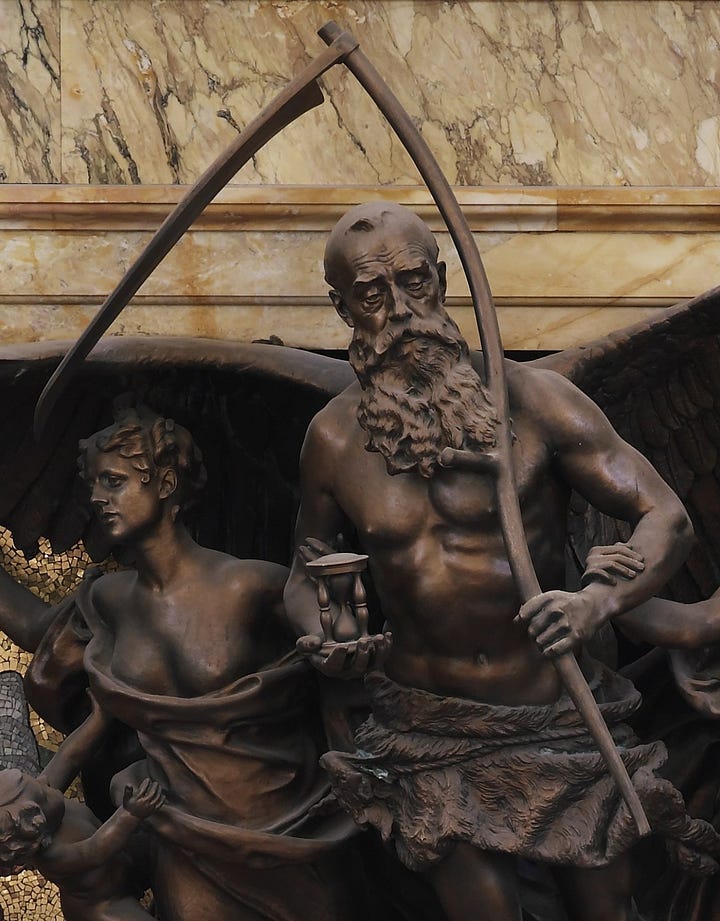Fresh Batch #129: Mazzaroth, The Reaping Wheel
The Stewards of the Mysteries of God: Goodfellas
Mazzaroth appears in the Book of Job (Jove) as MZRUT (מזרות):
Mazzaroth only makes sense in the context of the Latin-Celtic tongues. Mazza pertains to reaping and death, or instruments that ensure both. Do you know how many individuals I’ve seen notice this besides me? Zero. Not one man amongst you. So am I the profane outcast who knows nothing, or am I the only one who still has the sight, the holy eye (sac-occhio)?
Roth pertains to wheel in the Welsh, Irish, and Latin (Rota). It’s anecdotally in the middle of astrotheology. I suspect that Rhodos, the Goddess and wife of the sun, is named after the Welsh Rhôd with the addition of a Greek termination -os, and the Island of Rodos, or of the Rose, of Rhode, is allegorizing Time, or vice versa, that from Rodos came Rota, Rhod, and Roth. But from my perspective, I’m now going with the former because Bishop Thirwall claimed it was the Phoenicians who civilized the Greeks, that when they first encountered them, the Greeks hadn’t even harnessed fire yet. I’m not sure about the extent of his claims because it seems extreme to me, but in terms of language and mythology, I’ve demonstrated it is true to some extent.
By acknowledging that Mazzaroth is the Zodiac, you acknowledge that it is a Celtic-Latin Wheel of Death, Wheel of Reaping, or Wheel of Time, the Father of which is Time, Saturn, the old name for the sun: Kronos, who was called Israel by the Phoenicians. The name Saturn was not ascribed to the slow-moving planet till the turn of the millennia of the Common Era.
From Kronos, if it doesn’t originate from the Irish Cron, we get terms like chronology. I’m willing to entertain a Celtic origin of Kronos because of the affinity that the Irish language has to the Sicilian Phoenician, and the Greeks took their mythology from the Phoenicians and Etruscans, and invented their own. What is the instrument of Death, Father Time? The scythe, a tool for reaping. He is the two-faced god (Janus) who consumes his children, for those who are born in time must die in time.




There are two cycles of time in each day of 12 hours; one in life, in heaven, in daytime, in light, the other in death, in hell, in nighttime, or in darkness. There is one cycle of time in a year of 13 months, by the reckoning of the moon, but the reckoning of the moon does not dictate the seasons and cause life and death. That is the business of the sun, who brings us life in spring and summer, in one portion of the year, and then brings us death in autumn and winter. This cycle is reckoned by the Zodiac, or the twelve signs of Mazzoroth, the Wheel of Death, Time, or Reaping, and reckoned by Saturn, the sun in winter, the god of Hell or the Underworld (Pluto, Hades, Hermes, Anubis, Jesus, etc.) who starts the year in January, when hell, darkness, and death reign, named after Janus, the Door (Ianua) of the Year. These archetypes are allegorized as leading the souls, the eudaimones, across the river of oblivion to be begin anew. This is the cycle of life and death, and if our existence correlates to what is seen in the cosmos, it will be our fate to die and be born again.
This is Etruscan, Roman, and Celtic symbolism, what is called Paganism by those to whom the Gospel is preached. But you, to whom the Gospel, the Goat Spell, the God Spell, or the Good News is preached, are considered beggars, wretched πτωχοὶ (ptokoi), those who crouch and cringe: profane rabble. You are compared to the blind, the lame, the lepers, the deaf, and the dead. This is not my opinion. It is clearly written in the scriptures you hold so dear.
“Then Jesus answering said unto them, Go your way, and tell John what things ye have seen and heard; how that the blind see, the lame walk, the lepers are cleansed, the deaf hear, the dead are raised, to the beggars the gospel is preached.”
Christianity is the imitation of what is erroneously and unjustly called Paganism, a term not ever used for derogatory purposes till the so-called Christians came along, but was instead a Latin word for villager, the plural of which is Pagani.
The following seems to mock the Gauls, or Celts, a tactic used by the priests to scare people from returning to their roots because it occurs in Galatians. Contemplate it in the context of a group of men, hijacking a tradition of a culture, putting their own spin on it through forgery, and then telling everyone that if they preach the Gospels in any way other than that which the authorities of the new system preach, they will be cursed. This is quite literally the most un-Roman position that one could take on the subject of religion or spirituality.
“But even if we or an angel out of heaven should evangelize to you contrary to what we proclaimed to you, let him be accursed.” —Galatians 1:8
An angel out of heaven! Pardon the pun, but the gall these miserable wretches have is unparalleled. How anyone can read the above passage and not recognize it is the work of the most ungodly, unjust men, ever to have existed, is beyond me. This passage is not something a Christian would ever say, which I will remind you solely means Good Fellow, or Good Man. How do I know this? Even in Greek, the word Christian, or Christianos, is a Greek root with a Latin termination affixed to it, but the eta (Η, η) was erroneously Latinized, which is a corruption (because it is properly transliterated from Greek as Chres in uncorrupted Latin). You can see this in the root of all these words that pertain to good: ΧΡΗΣ, or χρησ (hence the first time people see this word in Latin, it looks like Chrestus):

Rev. Taylor wrote (Syntagma, p. 124.), “The complimentary epithet, Chrest, (from what is called the Iotacism, or change of the long E into I, a term of respect, grew into one of worship,) signified nothing more than a good man. Clemens Alexandrinus, in the second century, founds a serious argument on this parnomasia, that (Lib. 3. c. 17, p. 53, et circa.—Psal. 55, D.) all who believed in Chrest, (i.e. in a good man,) both are, and are called Chrestians, that is, good men.—Strommata, b. 2.
“It has been the universal trick of the Christian evangelizers, to plagiarize and adopt pagan documents and christen them into Gospels; and to give a Christian turn of the matter, to an unquestionably idolatrous phraseology.”
Justin Martyr wrote in his apology to Antoninus Pius, “We are called Christians. So then we are the best of men (Chrestians), and it can never be just to hate what is good and kind.”

The translation in the following translates Chrestian as excellent, but as you can see from the Greek lexicon above, the root is Chris/Chres, or ΧΡΗΣ prior to the iotacism.
Thus, the appearance of it in the same document as Χριστιανοί (Christians), the root being ΧΡΙΣ (Chris), is concerning and may indicate forgery that occurred post-iotacism.
The word appearing as chrisos (χρισος) rather than chresos (χρησος) in some of the work of Justin Martyr (noticed by Godfrey Higgins in Anaclypsis) is evidence of the manuscript’s corruption, which I withhold judgement on because I’m not sure whether it was the copyists who corrupted it or if Justin Martyr was corrupt from the beginning. Recall that the further back in history language goes, the more the sigma-tau (ST) becomes interchangeable with simply sigma (S). We still see this in our English words, where the pronunciation of the tau (T) is omitted, i.e., listen, epistle, Christmas, mistle-toe, etc.
The standard of being a Christian is simply this: are you a good man or woman? That’s it. All these requirements, i.e. believing the Bible is inspired by God (I’ve proven it isn’t), God existing in three persons (I’ve proven these are the three aspects of the sun throughout the year, the thrice-great nature of it), that Jesus Christ is the Son of God, born of the Virgin Mary, that he shed his blood on the cross, dying for our sins, and then resurrected (I’ve proven that this is an allegory for an astronomical occurrence that plays out in the drama of the skies every year, and that these are all qualities of the sun-gods), that the Holy Spirit is the third person of the Trinity (I’ve demonstrated what the Holy Ghost actually is in Nature, and that the Trinity comes from in the Orient), or that all true believers from the day of the Pentecost until the rapture are members of the universal (Catholic) church (apparently the standard was lowered to believing, and that believing was all that was actually required when the divine inspiration of the Bible read “And Ye Shall Know the Truth, and the Truth shall make you free”).
All of these standards are man-made hogwash dreamt up by uninitiated irresponsible people. It has nothing to do with the qualification of being a Christian. And for those who wonder whether they are good people or not, just ask yourself this: does my behavior harm others? If the answer is no, then congratulations, you are solely good. If the answer is yes, then see where you can improve, and as long as you do, then you’re going in the direction of good. Good and evil are a way of behaving. Do you think it’s coincidence that Good is God and Evil is in Devil? People are capable of doing both types of deeds, but their nature of being good or evil is judged on an accumulating scale over time. All bad behavior is boiled down to theft. The only commandment that was needed was Thou shalt not steal. Everything else is redundant.
For the record, I don’t identify as Pagan or Abrahamic, or even religious. I don’t believe. I know, or I concede that I don’t know. I was baptized and I am culturally Christian. I acknowledge there is a Creator and that we are in a creation, but I don’t accept ideas or information that can’t be demonstrated. The air you breathe is pressurized at approximately 14.7 PSI at sea level. Is there any scientific evidence of gas pressure existing without the necessary antecedent of containment? No? Then congratulations, you live in a contained world and all the garbage that’s taught to you about outer space is nothing but fiction. The fields of Cosmology, Astrophysics, Astronomy, etc. are not science. They are pseudo science. The only thing they’ve sent into outer space is your ability to think critically. But even those lies will come to an end as more of you take up the sword of Truth.
For those interested, invest in yourself and make your way through the Spirit Whirled series.






The master class on Italian, British, and German philology will continue on the other side for those who support this work. It is significant if you’re interested in a return to common sense and real history.
Become a member to access the rest of this article.
Keep reading with a 7-day free trial
Subscribe to Ancient History, Mythology, & Epic Fantasy to keep reading this post and get 7 days of free access to the full post archives.
















